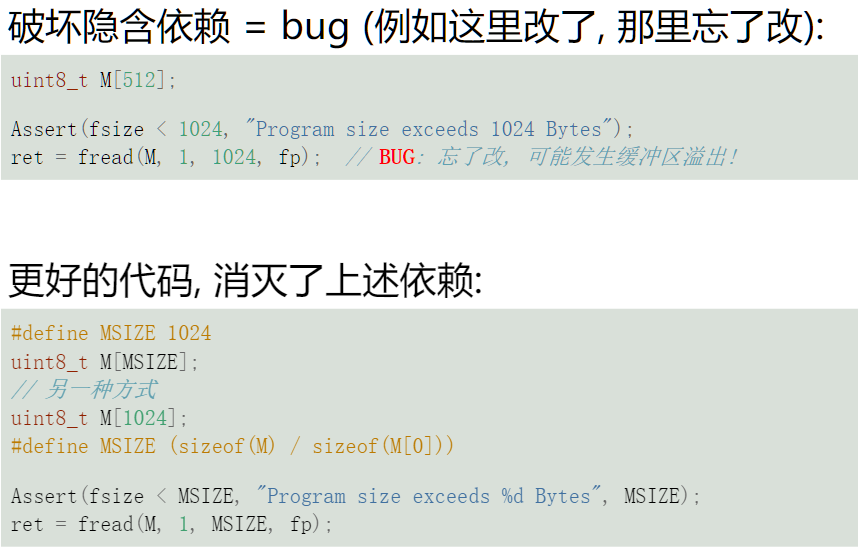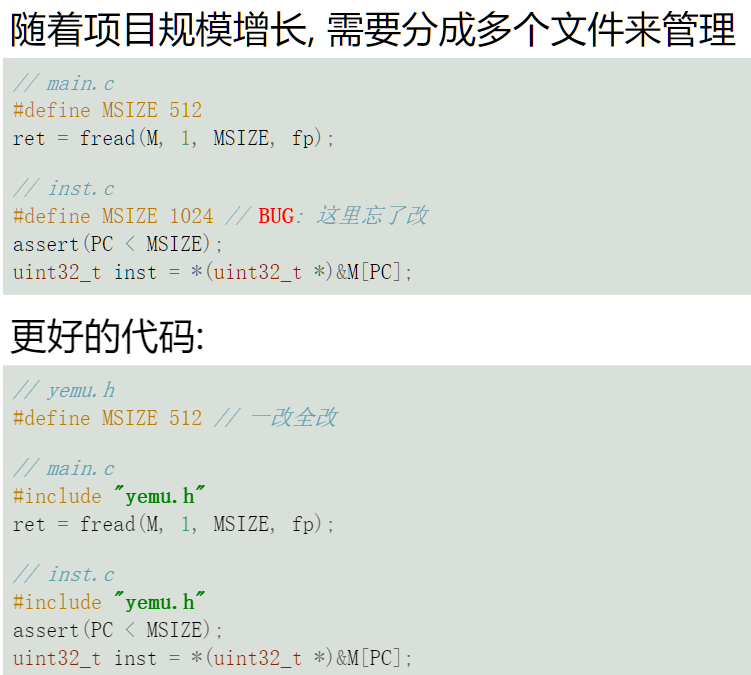程序的执行和模拟器
freestanding运行时环境
- 先前使用的环境是宿主操作环境
- 但是并不清楚
pringf到底在哪实现了 - 因此,在学习时候,使用freestanding环境更加简单
[!note] 什么是freestanding环境 - freestanding implementation:不能包含C标准库,只能包含基本的头文件 - hosted implementation:能包含所有的C标准库 - freestanding environment:在这种环境下编译的程序,不能包含完整的C标准库,甚至连main入口都没有 - 应用:kernel开发,C标准库开发 - hosted environment:通常的编译环境,以
main为入口,可以包含完整的C标准库。 - 因此基于操作系统上的应用程序开发,都可以称为hosted environment,可以直接使用现成的C标准库
- 但是并不清楚
编写可读可维护的代码
- 调试的最高境界:不用调试
Programs are meant to be read by humans and only incidentally for computers to execute. --D.E.Knuth
- 编写可读可维护的代码:
- 不言自明:看代码即可明白是做什么的
- 不言自证:看代码即可知道是否正确
防御性编程
-
不相信外界的输入/其他函数传递的参数,通过断言提前拦截非预期的情况
#include <assert.h> // ... int main(int argc, char *argv[]) { PC = 0; R[0] = 0; assert(argc >= 2); // 要求至少包含一个参数 FILE *fp = fopen(argv[1], "r"); assert(fp != NULL); // 要求argv[1]是一个可以成功打开的文件 int ret = fseek(fp, 0, SEEK_END); assert(ret != -1); // 要求fseek()成功 long fsize = ftell(fp); assert(fsize != -1); // 要求ftell()成功 rewind(fp); assert(fsize < 1024); // 要求程序大小不超过1024字节 ret = fread(M, 1, 1024, fp); assert(ret == fsize); // 要求完全读出程序的内容 fclose(fp); while (!halt) { inst_cycle(); } return 0; } -
防御性编程的意义:
- 将预期的正确行为直接写到程序中
- 程序中的断言足够多->近似证明了程序的正确性
减少代码中的隐含依赖
- 使用define的方式,减少代码中的隐含依赖
- 进行一次性修改

- 进行一次性修改
将定义放在头文件中

拒绝copy-paste
- 需要看很久的代码,基本上很难做到不言自证
- 粘贴出上百行的代码,容易漏掉几处
编写可复用的代码
- 通过变量,函数,宏的方式消除重复/相似的代码
uint32_t inst = *(uint32_t *)&M[PC]; uint32_t opcode = inst & 0x7f; uint32_t funct3 = (inst >> 12) & 0x7; uint32_t rd = (inst >> 7 ) & 0x1f; uint32_t rs1 = (inst >> 15) & 0x1f; uint32_t imm = ((inst >> 20) & 0x7ff) - ((inst & 0x80000000) ? 4096 : 0); if (opcode == 0x13) { if (funct3 == 0x0) { R[rd] = R[rs1] + imm; } // addi else if (funct3 == 0x4) { R[rd] = R[rs1] ^ imm; } // xori else if (funct3 == 0x6) { R[rd] = R[rs1] | imm; } // ori else if (funct3 == 0x7) { R[rd] = R[rs1] & imm; } // andi else { panic("Unsupported funct3 = %d", funct3); } R[0] = 0; // 若指令写入了R[0], 此处将其重置为0 } else if (...) { ... } PC += 4;
使用合适的语言特性
- 把细节交给语言规范和编译器
typedef union { struct { uint32_t opcode : 7; uint32_t rd : 5; uint32_t funct3 : 3; uint32_t rs1 : 5; int32_t imm11_0 : 12; } I; struct { /* ... */ } R; uint32_t bytes; } inst_t; inst_t *inst = (inst_t *)&M[PC]; uint32_t rd = inst->I.rd; uint32_t rs1 = inst->I.rs1; uint32_t imm = (int32_t)inst->I.imm11_0; if (inst->I.opcode == 0b0010011) { switch (inst->I.funct3) { case 0b000: R[rd] = R[rs1] + imm; break; // addi case 0b100: R[rd] = R[rs1] ^ imm; break; // xori case 0b110: R[rd] = R[rs1] | imm; break; // ori case 0b111: R[rd] = R[rs1] & imm; break; // andi default: panic("Unsupported funct3 = %d", inst->I.funct3); } R[0] = 0; // 若指令写入了R[0], 此处将其重置为0 } else if (inst->bytes == 0x00100073) { ... }